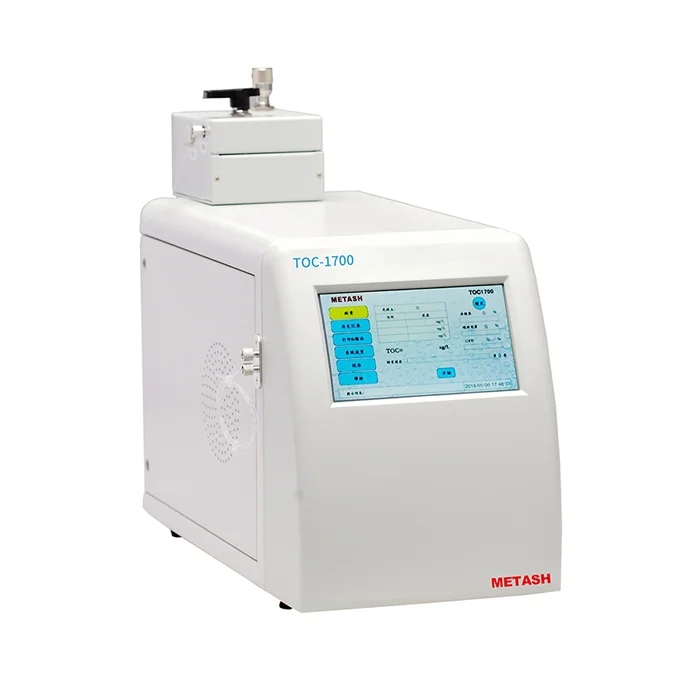- This topic is empty.
-
AuthorPosts
-
2025-05-27 at 6:39 pm #63734
In advanced industrial sectors such as semiconductor manufacturing, pharmaceuticals, and power generation, ultrapure water (UPW) is not just a requirement—it is a critical process component. The integrity and reliability of UPW directly influence product quality, system efficiency, and regulatory compliance. Among various parameters used to assess UPW, Total Organic Carbon (TOC) stands out as a key indicator of water purity. In this blog post, Metash, a high performance laboratory equipment manufacturer, will share the role of online total organic carbon analyzer in ultrapure water quality testing, which can monitor and control organic pollutants in real time.
Understanding Online Total Organic Carbon in Ultrapure Water
Total Organic Carbon (TOC) is a non-specific indicator of organic contamination in water. It measures the total amount of carbon found in organic compounds and serves as a proxy for potential impurities that could affect processes or product quality. TOC does not identify specific compounds but provides a cumulative measure of all organic content, making it extremely valuable in systems requiring high purity.
In UPW systems, organic contamination can originate from:
* Resin degradation in ion exchange columns
* Bacterial growth and biofilm formation
* Organic leaching from polymeric materials
* Ingress of ambient air or process chemicals
Even trace levels of organic compounds (parts per billion or lower) can disrupt high-sensitivity applications. In the semiconductor industry, for instance, organics can adhere to wafer surfaces, causing defects at the nanometer scale. Similarly, in pharmaceutical production, TOC levels are critical for cleaning validation and meeting pharmacopeial standards.

Online Total Organic Carbon Analyzer in Water Quality Testing
Online TOC analyzers are designed to provide continuous, real-time measurement of TOC levels in UPW systems. Their operation typically involves the following sequential steps:
1. Sample Collection and Conditioning:
A small volume of UPW is continuously diverted from the main flow for analysis. Sample conditioning may involve filtration and temperature control to ensure consistent measurement.
2. Oxidation of Organic Compounds:
Organic carbon is converted into carbon dioxide (CO₂) via oxidation. Various oxidation techniques include:
* UV Persulfate Oxidation: A combination of ultraviolet (UV) light and sodium persulfate produces hydroxyl radicals that aggressively oxidize organic matter.
* High-Temperature Combustion: Organic compounds are combusted in the presence of oxygen at temperatures above 600°C.
* UV Photolysis: UV light alone can break down organics, though this method may have lower efficiency for complex molecules.
3. CO₂ Detection:
The generated CO₂ is quantified using a detection method such as:
* Non-Dispersive Infrared (NDIR): Measures infrared absorption specific to CO₂ molecules.
* Conductivity Detection: Measures the change in conductivity due to carbonic acid formed when CO₂ dissolves in water.
4. Data Analysis and Reporting:
The analyzer calculates TOC concentration (typically in µg/L or ppb) and logs the data. Alarm thresholds can be set to initiate corrective actions in case of contamination.
Advantages of Online Total Organic Carbon Analyzer
The shift from offline batch sampling to online TOC analysis offers several compelling benefits in UPW monitoring:
1. Real-Time Monitoring:
Continuous data allows for immediate detection of anomalies, enabling rapid response to contamination events.
2. Automation and Integration:
Online TOC analyzers can be integrated with control systems (e.g., SCADA or DCS) for automated process control and documentation.
3. Regulatory Compliance:
Online systems facilitate compliance with industry standards such as:
* USP <643> and EP 2.2.44 for pharmaceutical-grade water
* SEMI F63 and SEMI E49 for semiconductor applications
4. Reduced Labor and Sampling Error:
Automated systems minimize the need for manual sampling and analysis, reducing variability and operational overhead.
5. Data Integrity:
Online analyzers support secure data logging, audit trails, and trend analysis, aligning with cGMP and 21 CFR Part 11 requirements.
Applications of Online Total Organic Carbon Analyzer
Online TOC analyzers find applications across a wide range of industries where ultrapure water is a process-critical resource:
Semiconductor Manufacturing
In semiconductor fabrication, even minuscule organic contamination can lead to yield loss and defects. Online TOC monitoring is deployed at various points in the UPW loop—particularly after reverse osmosis (RO), deionization, and UV treatment stages. By maintaining TOC levels below stringent limits (often <5 ppb), manufacturers can ensure process reliability for advanced nodes (e.g., <5 nm).
Pharmaceutical and Biotechnology
In pharmaceutical production, TOC is used to verify water quality for injection (WFI), cleaning validation, and monitoring of water-for-pharmaceutical-use (WPU) systems. Online TOC analyzers enable real-time quality assurance and support regulatory compliance with pharmacopeial standards. For example, TOC must be less than 500 ppb in WFI according to USP <643>.
Power Generation
In high-pressure boiler systems, organic contaminants can decompose into corrosive species at elevated temperatures, posing risks of stress corrosion cracking and fouling. Online TOC analyzers help monitor condensate and feedwater purity, protecting turbines and heat exchangers from degradation.
Food and Beverage
Though not always requiring UPW, certain food and beverage processes use purified water where TOC control ensures taste, shelf-life, and safety. Online TOC analyzers provide real-time assurance of water quality used in formulation and cleaning.
Conclusion
Online Total Organic Carbon Analyzers provide continuous, accurate, real-time monitoring of organic contaminants, forming the cornerstone of modern water quality assurance. Whether ensuring the integrity of semiconductor wafers, validating pharmaceutical processes, or protecting power plant assets, online Total Organic Carbon (TOC) analysis provides actionable insights to ensure operational peace of mind.
http://www.metashcorp.com
Metash -
AuthorPosts
- You must be logged in to reply to this topic.
